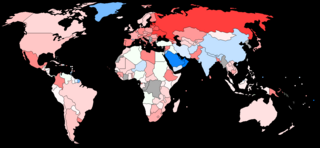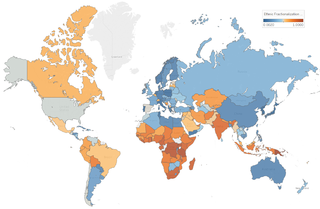 W
WMaternal death, also called maternal mortality, is defined by the World Health Organization (WHO) as "the death of a woman while pregnant or within 42 days of termination of pregnancy, irrespective of the duration and site of the pregnancy, from any cause related to or aggravated by the pregnancy or its management but not from accidental or incidental causes." The maternal mortality ratio, on the other hand, is the number of maternal deaths per 100,000 live births. The maternal mortality ratio is used as a criterion for the quality of medical care in a country. The global rate is 211 maternal deaths per 100,000 live births.
 W
WThis is a list of gay villages, urban areas with generally recognized boundaries that unofficially form a social center for LGBT people. They tend to contain a number of gay lodgings, B&Bs, bars, clubs and pubs, restaurants, cafés and other similar businesses. Some may be gay getaways, such as Provincetown or Guerneville.
 W
WThe under-five mortality rate is the number of deaths of infants and children under five years old per 1000 live births. The under-five mortality rate for the world is 39 deaths according to the World Bank and the World Health Organization. 5.3 million children under age five died in 2018, 14,722 every day.
 W
WThis is a list of Chinese administrative divisions in order of their total resident populations. It includes all provinces, autonomous regions, direct-controlled municipalities and special administrative regions controlled by the Republic of China (1912–1949) or the People's Republic of China (1949–present). For the Republic of China after 1949, see List of administrative divisions of Taiwan.
 W
WThe article documents lists of countries by average life expectancy at birth by various sources of estimates.
 W
WThis article is a list of countries by median age.
 W
WThe human sex ratio is the number of males for each female in a population. This is a list of sex ratios by country or region.
 W
WThis page contains lists of countries ranked by ethnic and cultural diversity level.
 W
WThis is a list of ethnic enclaves in various countries of different ethnic and cultural backgrounds to the native population. An ethnic enclave in this context denotes an area primarily populated by a population with similar ethnic or racial background. This list also includes concentrations rather than enclaves, and historic examples which may no longer be an ethnic enclave.
 W
WThis article includes two versions of the list of countries by crude mortality rate.
 W
WThe population statistics for Israeli settlements in the West Bank are collected by the Israel Central Bureau of Statistics. As such, the data contains only population of settlements recognized by the Israeli authorities. Israeli outposts are not tracked, and their population is hard to establish. In addition to these, Nahal settlements are formally considered military outposts, and their population is counted, but not reported. Once a Nahal settlement becomes a civilian locality, it starts to be reported.